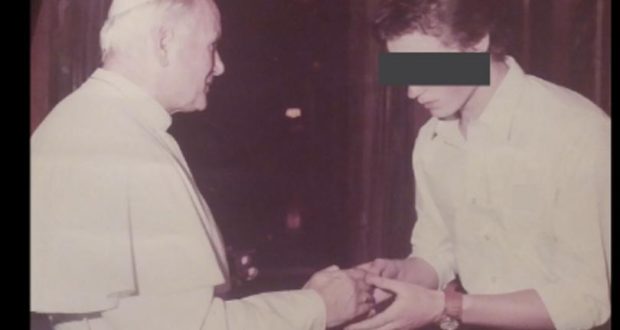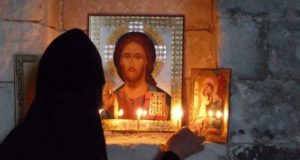الصورة: المُتوفّي في شبابه مع البابا يوحنا بولس الثاني – بقلم دوروثي كامينغز ماكلين.
“مات من نوبة قلبية أصيب بها في 6 تشرين الثاني (نوفمبر) ، ولذا فقد جوع لمدة أسبوعين تقريبًا ، بدون ماء وحشو ميدازولام [مسكن] ، لم يتسبب في وفاته” ، غردت أخته بسخرية.
السبب الرسمي لوفاة مريض بولندي كاثوليكي في قلب نزاع يتعلق بالحق في الحياة في إنجلترا ليس هو ما تعتقده: بينما توفي المريض ، المعروف في العالم الناطق بالإنجليزية باسم “RS” ، بعد أسبوعين تقريبًا تمت إزالة نظام التغذية والماء الذي يتلقاه (CANH) للمرة الأخيرة ، وكشفت إحدى شقيقاته أن الأسباب الرسمية لوفاته هي الالتهاب الرئوي والحرمان من الأكسجين والنوبة القلبية.
“تلقينا معلومات غريبة من المستشفى حول أسباب وفاة شقيقنا” ، غردت شقيقة RS مستخدمة الاسم المستعار “Agata”. أمر محكمة يمنع نشر أسماء عائلة ر.
ثم نشرت أجاتا باللغة البولندية ما قاله لها المستشفى وعائلتها.
“لقد تلقينا اتصالات من عائلة RS تتعلق بأمور متعلقة بوفاته. نكتب ، لذلك ، لتقديم وجهة نظرنا الحالية للقضية ، يزعم أن المستشفى كتب.
“سيسجل السبب الطبي للوفاة على النحو التالي: 1 أ. 1 ب نقص الأكسجة [نقص الأكسجين] في الدماغ ؛ 1C احتشاء عضلة القلب [نوبة قلبية] “، وتابع. “تم التحقيق في الوفاة من قبل الطبيب الشرعي ، وليس لديه مخاوف”.
نشرت شقيقة RS أيضًا رد المستشفى على طلب العائلة لتشريح الجثة.
طلبت الأسرة تشريح الجثة. ولم يذكروا أي أسباب لهذا الطلب. ومع ذلك ، نظر صندوق [NHS] والفاحص الطبي في ما إذا كان تشريح الجثة مطلوبًا وأبدوا رأيهم بأنه لا توجد أسباب لإجراء تشريح الجثة ، لأنه لا توجد مخاوف بشأن السبب الطبي للوفاة “.
اعترضت أجاتا على عدم ذكر الظروف التي عاش فيها شقيقها ، والتي قال الأطباء إنها قد تستمر لأكثر من خمس سنوات ، إذا استمر في تلقي CANH.
وكتبت ساخرة: “لقد توفي بنوبة قلبية أصيب بها في 6 نوفمبر ، ولذا فقد جوع لمدة أسبوعين تقريبًا ، بدون ماء وحشو ميدازولام [مسكن] ، لم يتسبب في وفاته”. “لسوء الحظ ، سيتم حرق جثة أخي غدًا [29 يناير] ولن نتمكن من إثبات أي شيء.”
نشر صندوق الخدمات الصحية الوطنية في مستشفيات جامعة بليموث بيانًا أمس يقدم التعازي للعائلة ويؤكد أن الطاقم الطبي المعني بالقضية “تصرف بحنان واحتراف طوال الوقت”.
وأضاف المتحدث الذي لم يذكر اسمه: “… نود أن نعترف بذلك ونشكرهم على رعايتهم”.
أصيب RS ، وهو رجل عائلة في منتصف العمر ، بنوبة قلبية وتلف دماغيًا خطيرًا في 6 نوفمبر. بحلول ديسمبر ، رغب أطباء المستشفى في التوقف عن الرعاية الأساسية للرجل المصاب بالغيبوبة ، حيث اعتقدوا أن لديه فرصة ضئيلة للتقدم إلى حتى في حالة الحد الأدنى من الوعي ، وقد تعيش خمس سنوات أو أكثر في تلك الحالة.
وقفت زوجة ر. س إلى جانب الأطباء ، لكن عائلته ، بما في ذلك والدته وشقيقتان وابنة أخته ، لم تفعل ذلك. صرحت زوجة ر. س. أن زوجها لا يريد أن يكون عبئًا على أسرته وأنه لا يريد أن يراه أطفاله وهو في حالة إعاقة. ومع ذلك ، جادلت الأسرة المولودة في ر. س. بأنه كان كاثوليكيًا ذا توجه إلى الكنيسة وله آراء قوية مؤيدة للحياة ، ويعارض الإجهاض – بما في ذلك الأطفال المعوقين – والقتل الرحيم ، واعترض على قرارات المحكمة التي تقصر حياة الرضيع ألفي إيفانز. لذلك اعتقدوا أنه لا يريد أن يموت من إزالة CANH.
في 15 ديسمبر 2020 ، قرر القاضي كوهين من محكمة الحماية أن إزالة CANH كان في مصلحة جمهورية صربسكا وأن زوجته البالغة من العمر 17 عامًا يجب أن تعرف رغباته بشكل أفضل مما عرفته عائلته. ومع ذلك ، حاولت والدة ر .س ، وشقيقاتها ، وابنة أختها استئناف القرار في المحاكم البريطانية ، وبدعم من الحكومة البولندية ، للحصول على فترة راحة في المحكمة الأوروبية لحقوق الإنسان (ECHR).
على الرغم من أنهم تمكنوا في ثلاث مناسبات من إعادة CANH الخاص بـ RS ، إلا أنهم لم ينجحوا في نهاية المطاف في إقناع المحاكم البريطانية أو المحكمة الأوروبية لحقوق الإنسان بإلغاء حكم القاضي كوهين.
أصبحت القضية قضية مشهورة في بولندا ، وأعلنت الحكومة البولندية أنها تتخذ إجراءات في القضية. عندما فشلت المقاربات الدبلوماسية الأولية تجاه بريطانيا ، أصدرت الحكومة البولندية جواز سفر دبلوماسيًا لجمهورية صربيا ، ظاهريًا لإخراجه من اختصاص المحاكم البريطانية.
قضت محكمة في وارسو بأنه كان من القانوني نقله من إنجلترا واستعادة علاجه الداعم للحياة. وكانت عيادة بولندية متخصصة في إعاقات الوعي قد عرضت علاجه. ومع ذلك ، بعد موجة من النشاط من جانب الحكومة البولندية ، كان هناك تأخير طويل في المفاوضات التي كانت قاتلة لجمهورية صربسكا. توفي يوم الثلاثاء 26 يناير.
المصدر: LifeSiteNews
A man was starved to death in the hospital. The ‘official’ cause of death will surprise you
By Dorothy Cummings McLean ‘He died from a heart attack that he had on November 6, and so his being starved for almost two weeks, without water and stuffed with midazolam [a sedative], didn’t cause his death,’ his sister tweeted sarcastically.
The official cause of death for a Polish Catholic patient at the heart of a right-to-life dispute in England is not what you think: While the patient, known to the English-speaking world as “RS,” died almost two weeks after his clinically assisted nutrition and hydration (CANH) were removed for the last time, one of his sisters revealed that the official reasons for his death are pneumonia, oxygen deprivation, and a heart attack.
“We received peculiar information from the hospital about the reasons from our brother’s death,” tweeted RS’s sister, using the penname “Agata.” A court order forbids the publication of RS’s family’s names.
Agata then published in Polish what the hospital had told her and her family.
“We have received communications from the family of RS touching on matters related to his death. We write, therefore, to present our current view of the case,” the hospital allegedly wrote.
“The medical cause of death will be recorded as: 1a bronchopneumonia; 1b hypoxia [oxygen deprivation] of the brain; 1c myocardial infarction [heart attack],” it continued. “The death was investigated by the medical examiner, who has no concerns.”
RS’s sister also published the hospital’s response to the family’s request for an autopsy.
“The family requested a post-mortem. They did not give any reasons for this request. However, the [NHS] Trust and the medical examiner considered whether the post-mortem is required and gave their opinion that there were no grounds for carrying out an autopsy, because there are no concerns regarding the medical cause of death.”
Agata objected to no mention being made of the circumstances in which her brother’s life, which doctors said could last longer than five years, if he continued to receive CANH.
“He died from a heart attack that he had on November 6, and so his being starved for almost two weeks, without water and stuffed with midazolam [a sedative], didn’t cause his death,” she wrote sarcastically. “Unfortunately, my brother will be cremated tomorrow [January 29], and we won’t be able to prove anything.”
The University Hospitals Plymouth National Health Service Trust published a statement yesterday offering condolences to the family and asserting that the medical personnel involved in the case had “acted with compassion and professionalism throughout.”
“… [W]e would like to acknowledge that and thank them for their care,” the unnamed spokesperson added.
RS, a middle-aged family man, suffered a heart attack and sustained serious brain damage on November 6. By December, his hospital doctors wished to discontinue the comatose man’s basic care, as they believed that he had only a small chance of progressing to even a minimally conscious state, and might live five years or more in that state.
RS’s wife sided with the doctors, but his birth family, including his mother, two sisters, and niece, did not. RS’s wife stated that her husband would not want to be a burden on his family and that he would not want his children to see him in his disabled condition. RS’s birth family, however, argued that he was a church-going Catholic with strong pro-life views, opposed to abortion — including of disabled children — and euthanasia, and had objected to court decisions shortening the life of infant Alfie Evans. They believed, therefore, that he would not want to die from the removal of CANH.
On December 15, 2020, Justice Cohen of the Court of Protection decided both that the removal of CANH was in RS’s best interests and that his wife of 17 years must have known his wishes better than his birth family did. However, RS’s mother, sisters, and niece attempted to appeal the decision in the British courts and, with the support of the Polish government, to find respite in the European Court of Human Rights (ECHR).
Although they managed on three occasions to have RS’s CANH returned, they were ultimately unsuccessful in persuading either the British courts or the ECHR to overturn Justice Cohen’s ruling.
The case became a cause celebre in Poland, and the Polish Government announced that it was taking action in the case. When initial diplomatic approaches to Britain failed, the Polish government issued RS a diplomatic passport, ostensibly to take him out of the jurisdiction of the British courts.
A Warsaw court ruled that it was lawful to take him from England and restore his life-supporting treatment. A Polish clinic specializing in disabilities of consciousness had offered to treat him. However, after a flurry of activity on the part of the Polish government, there was a long delay in negotiations which proved fatal to RS. He died on Tuesday, January 26.
Agata thanked the birth family’s many supporters that day.
“Unfortunately, my brother died,” she tweeted in Polish. “I wish to thank everyone warmly for your help, support, and prayers. God took him to Himself, but we remain to make this world a better place. Your energy, kindness, and love will linger forever. I thank you with all my heart.”
For more information about the RS case, please click here.
To assist Christian Legal Centre, the British charity which supported RS and his birth family, please click here.
 Agoraleaks Agoraleaks
Agoraleaks Agoraleaks







